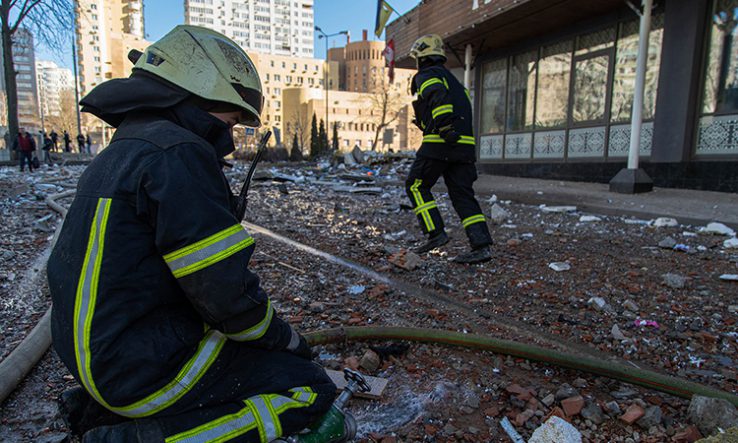
Image: Yan Boechat/VOA
Ukraine’s universities still teaching as colleagues overseas struggle to help
European organisations are considering how to provide deeper assistance to universities in Ukraine, after rushing to provide short-term support to academics fleeing Russia’s invasion.
In recent weeks the European Commission has launched an online portal providing information to Ukrainian academics on help being offered by nations and institutions across Europe, with many funding schemes being set up to support people through short stays.
Much early support focused on taking in people who had fled, but thoughts are now turning towards the roughly 50 per cent of Ukrainian universities that the country’s Ministry of Education and Science says have resumed activities via distance learning.
Ukraine’s Minister of Education and Science Serhiy Shkarlet said on 5 April that “on the 41st day of the war, despite the brutal aggression of the Russian Federation, educational institutions are [operating] in the regions where it is possible and allowed by the security situation”. This includes universities, where students are learning remotely or partly in person and partly online.
Michael Gaebel, director of the higher education policy unit at the European University Association, said the EUA contacted its Ukrainian members immediately after the invasion began on 24 February, but that communications had been “not very fluid, understandably, given the urgent pressures they have”.
“This makes it then tricky to get a clear idea how to provide support,” he said.
“It seems that universities are already providing online classes not only for their own students but often also for students of other universities that have been destroyed, or just had to stop provision.”
Gaebel said support provided by Europe could include supplying equipment such as laptops, but that it was “also a question of access to open educational resources and online labs”.
Support for distance learning in Ukraine has been coming in from around the world. The UN education organisation Unesco has said it will help Ukraine’s ministry create an online exam system for admitting students to universities. Research4Life, an international partnership of scholarly publishers and UN agencies, has dropped its already “low-cost” charge for providing Ukraine with access to tens of thousands of research journals.
While support for Ukraine has swelled, Russia is being increasingly isolated. Fifteen academic publishers, including some of the world’s largest, have jointly pledged to stop selling new services to the country.
Innovation services company Clarivate, the parent company of Research Professional News, has also halted commercial activity in Russia and launched an online resources centre enabling displaced researchers to access books, news and other resources.
Yevhenii Preobrazhenskyi, executive director of Ukraine’s national research and education services network, the URAN Association, told Research Europe that support for Ukraine and moves to isolate Russia were “worthy of deep respect” and a “big act of support”.
“We must understand well that the neutrality of science, especially in wartime, is a delusion,” he said. “Science is a powerful tool for developing new technologies, including technologies that can be used—and are being used—to wage war.”
But questions persist about the best ways to help as Russia’s attacks continue, more Ukrainians join the millions who have already fled and horrendous atrocities are uncovered.
Late in March, six academic groups including the EUA wrote to the European Commission asking it to set up a European expert group on students and researchers at risk to facilitate discussions between member states, EU institutions and the sector on ways Europe could offer funding and support.
MEP Christian Ehler backed the proposal, saying that currently “EU policy instruments are not ready” to provide the support Europe should be giving.
Although the crisis response from universities and the Commission so far has been “incredible” it is still not enough, he said. Ehler wants the proposed expert group to eventually contribute to the establishment of “a permanent European programme for researchers at risk”.
There are also concerns about what will happen when the fighting stops.
Gaebel said those fleeing Ukraine may choose not to return, which could have deep implications for the country’s future. “Younger people might not come back and contribute to the recovery and rebuilding of the country,” he said.
This article also appeared in Research Europe and a version also appeared in Research Fortnight